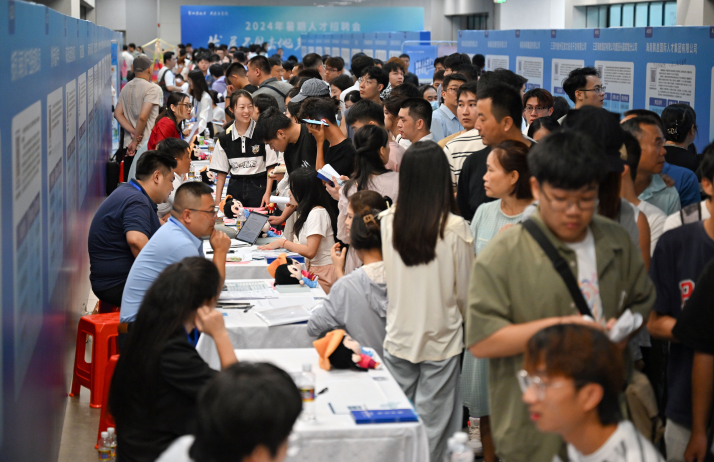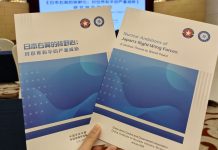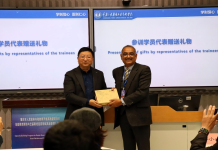
For Wang Zixin, a recent college graduate majoring in computer science and technology from Changchun, Jilin Province, the job hunt did not prove as challenging as he had anticipated.
Wang attended five job fairs and received seven job offers. Ultimately, he decided to accept a position at a bank.
“The job fairs, which were mostly organized by my university or the local district and city government’s human resources and social security departments, provided graduates like me with a wider range of options to consider,” Wang told Beijing Review. He added that the majority of his classmates were able to secure employment at a company or organization prior to graduation, with the exception of those who opted for more flexible forms of employment.
China created 6.98 million new urban jobs in the first half of this year, official data showed on July 23. In June, the country’s surveyed urban unemployment rate stood at 5 percent, with the employment situation remaining generally stable, according to the Ministry of Human Resources and Social Security.
China will develop sound mechanisms for promoting high-quality and full employment, refine the related public services system, and work hard to tackle structural unemployment, according to the resolution on further deepening reform comprehensively to advance Chinese modernization adopted at the Third Plenary Session of the 20th Communist Party of China (CPC) Central Committee, which took place in Beijing from July 15 to 18.
Employment goes first
The country has set an annual target of creating more than 12 million new urban jobs this year. It also aims to maintain the surveyed urban unemployment rate at around 5.5 percent this year.
The Ministry of Human Resources and Social Security attributed the stable performance of the job market to China’s ongoing economic recovery, a resurgence in service consumption, and faster growth in the industrial sector.
However, the ministry also cautioned that the external environment remains complex, domestic effective demand is still insufficient, and some enterprises continue to face relatively high pressures in production and operations. This, it noted, requires greater efforts to be made in order to bolster employment.
“We will improve the system of employment support for key groups such as college graduates, rural migrant workers and ex-service members, and the system of lifelong vocational skills training,” the resolution read.
The country will also improve the policy environment to boost employment by encouraging business startups, and support and regulate the development of new forms of employment.
It will also build a sound social security system to serve people in flexible employment, rural migrant workers and those in new forms of employment.
Wang expressed his appreciation for the government’s employment assistance policies in Jilin. “Graduates employed in Jilin with at least one-year labor or employment contracts, and who are making social insurance contributions, can receive monthly living allowances,” Wang explained. According to the policy document, the allowance amounts are 2,500 yuan ($344) for doctoral graduates, 1,500 yuan ($206) for master’s graduates, and 1,000 yuan ($137) for bachelor’s graduates. The subsidy period can last up to two years.
The policies also benefit those pursuing flexible employment. College graduates who are unemployed within two years of graduation can receive subsidies for their social insurance payments when they take on flexible jobs. The subsidy generally covers up to two thirds of their actual insurance contributions, for a maximum of two years. Similar policies have been launched in different localities based on local conditions.
Reflecting on the impact of these initiatives, Wang said, “The application process is quite straightforward. Benefiting from these supportive policies, we feel much more confident about securing our livelihoods after graduation.”
“High-quality employment cannot be achieved without the support of relevant national employment systems and policies,” Zhao Zhong, Dean of the School of Labor and Human Resources at Beijing-based Renmin University of China, told news portal Jiemian.com.
He said it also requires efforts from enterprises and cooperation between them and the government. “By aligning with social and economic development, enterprise transformation and upgrading, as well as the development of emerging industries, expanding the scale of employment and improving the quality of employment should be set as important goals for government policies and corporate social responsibility,” he said.
Secure the silver
Liu Chuanfang, a retiree from Nantong, Jiangsu Province, has recently secured a job with the help of her residential community’s employment service center, an initiative guided by the local government.
After retiring, Liu found herself feeling idle at home. However, she soon learned that her community had established an employment assistance hub right in the neighborhood. Interested, Liu decided to visit the service center and try her luck in finding a part-time job to supplement her income.
To Liu’s pleasant surprise, she was able to land a position at the cafeteria of a nearby vocational school. Reflecting on her newfound role, Liu told local newspaper Yangtse Evening Post, “The job is relatively light, and I find great joy in interacting with the energetic students. It has really reinvigorated me.”
Established across the country and guided by supportive local policies, these community-based employment service centers have proven to be invaluable resources, enabling residents like Liu and others to access job information and opportunities conveniently located right in their own neighborhoods.
Beyond just connecting job seekers to openings, these centers take a comprehensive approach to boosting local employment. They organize a variety of job-matching events, including online and offline job fairs, to help residents find suitable roles. These centers also arrange public welfare positions specifically to employ individuals facing difficulties in the job market.
Official data show that China was home to 297 million people aged 60 and above at the end of 2023, accounting for 21.1 percent of the total population.
To respond to population aging, China will refine the policies and mechanisms for developing elderly care programs and industries. “We will develop the silver economy and support the creation of diverse jobs tailored to elderly people,” the resolution adopted at the third plenary session said. It added that in line with the principle of voluntary participation with appropriate flexibility, China will advance reform to gradually raise the statutory retirement age in a prudent and orderly manner.
China’s statutory retirement age is 60 for men, 55 for female professionals and 50 for other female workers, with the average retirement age of people participating in employees’ pension insurance being under 55, the youngest in the world.
Due to factors such as personal choice, work status and physical condition, it is indeed difficult to adopt a “one-size-fits-all” model for retirement age. Delaying retirement by adhering to the principles of “voluntariness and flexibility” gave seniors more choices.
In the era of technological, digital and intelligent transformation, the traditional nine-to-five work model and high-intensity commuting requirements are no longer suitable for the population reaching or even exceeding the statutory retirement age, said Yuan Xin, Vice President of the China Population Association and a professor of demography at Nankai University.
“Therefore, we should explore more flexible and diverse work arrangements, including but not limited to adjustments to work hours, job nature, work location and compensation structure. For example, allowing them to choose part-time over full-time work based on individual circumstances, and utilizing modern communication technologies to work remotely from home, to reduce unnecessary commuting pressure and improve work efficiency and quality of life,” Yuan told news portal Southcn.com.
“The specific details of the implementation of this retirement age system still await the publication of the official plan,” Yuan concluded. –The Daily Mail-Beijing Review news exchange item





